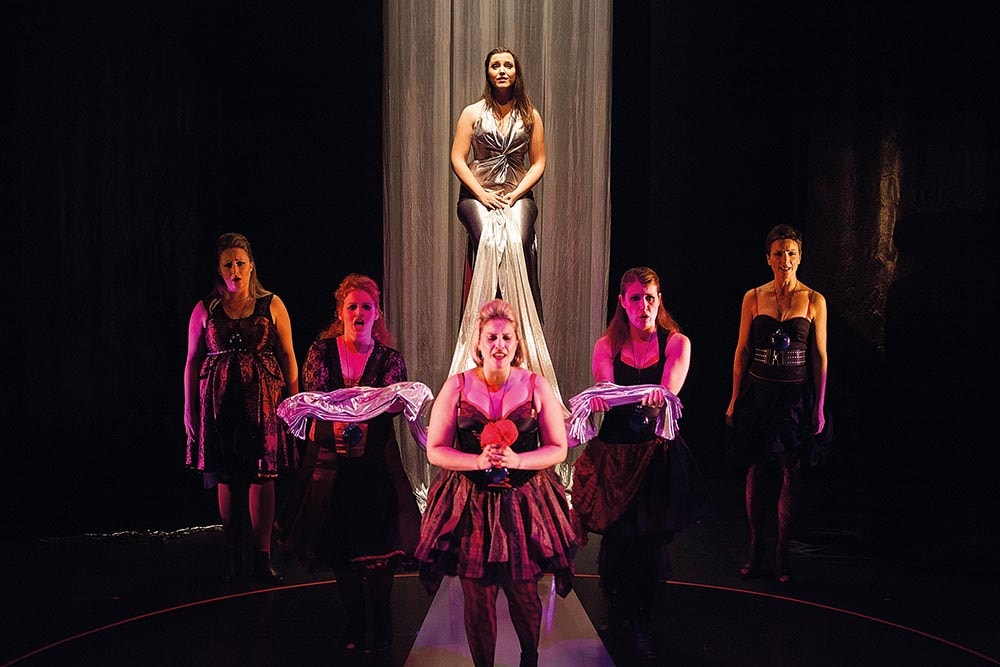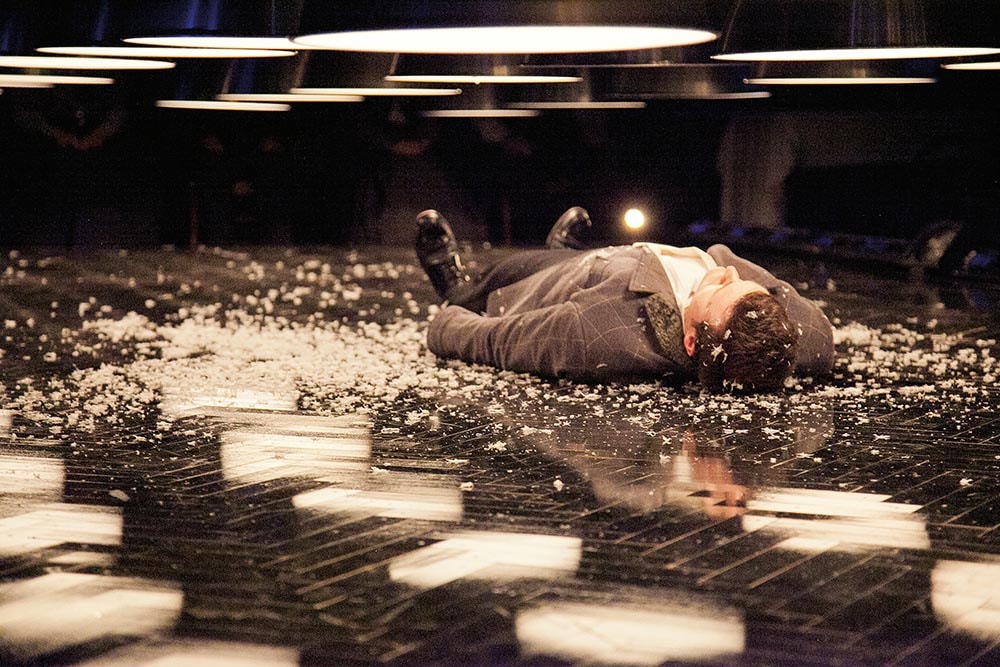It would be unfair and inaccurate to characterize big companies as stodgy bastions of mediocrity and feisty little companies as the guardians of the future. There are triumphs everywhere. No American opera general director can match the prodigious David Gockley, who in his more than 30-year tenure at Houston Grand Opera, set the bar for commitment to contemporary composers and repertoire, a tradition he continues in his current post at San Francisco Opera. And despite his gloomy lamentations, the Met’s Peter Gelb can take pride in having repopulated the house’s once-moribund repertoire with fresh works and fresh creative faces, while maintaining its stature as a glorious beacon of Western civilization.
Between the polarities of indies and giants, mid-size companies are also embracing innovation. Fort Worth Opera’s “Frontiers” program has placed the company squarely on the new-music circuit. Minnesota Opera commissioned Silent Night, garnering the 2012 Pulitzer Prize in Music for composer Kevin Puts. Mark Campbell wrote the libretto. Opera Theatre of Saint Louis, which has maintained financial integrity for nearly 40 years, presents old and new with equal élan. Its six-week festival format and intimate theatre (less than 1,000 seats) are scaled to its community, which supports it with an enviable attendance rate.
Opera Philadelphia’s David Devan says his company’s goal is “to get as many people seeing opera as possible.” His populist portfolio ranges from full-on productions at the 2,500 seat Academy of Music to an a cappella opera with six cast members in a 225-seat former pumping station. Devan’s primary strategy for expansion is partnership, whether it’s co-productions with the Santa Fe Opera or an upcoming collaboration with the Bearded Ladies Cabaret. Such partnerships have enabled Opera Philadelphia to expand its product offerings, not its budget. But daring does have its financial rewards: The company’s innovative programming has attracted what Devan calls “venture philanthropy” from funders eager to expand the Opera Philadelphia footprint.

The structure of these institutions is certainly at an inflection point, but an equally tectonic shift has occurred in opera’s fundamental musical and dramatic narrative. Even as indie opera adapts traditional forms into modern functions, large-scale opera is being unabashedly infused with the sound of musical theatre. We’re not talking about director Francesca Zambello’s acclaimed production of Show Boat at Lyric Opera of Chicago, or the same company’s successful run of Oklahoma! We’re talking about a generation of composers who emerged not from the dry-as-dust academy, but from the lights of Broadway.
“I started off as a musical theatre person,” says Jake Heggie, who, with his scores to Dead Man Walking and Moby-Dick, has become one of the most acclaimed and performed opera composers of his generation. Like his peers Mark Adamo and Ricky Ian Gordon, Heggie’s path to opera was guided more by Sweeney Todd than Wozzeck.
“I take all the things I love about musical theatre and write for classically trained voices,” says Heggie. “The theatre part of it is very important to me—the unfolding of events, the transformations. It has to be a story that lends itself to dramatic storytelling.” Nonetheless, in a nod to the grand-opera tradition, he says regardless of the narrative or venue “it has to be emotionally big. It has to be operatic. It has to be a story that will fill the house.”
Ironically, whereas writing an opera was once considered a High Art imprimatur for a commercial composer, Heggie says the pendulum can swing in the other direction as well. “At one point I thought I needed to write a musical,” he says, “but then I thought: I am. I’m writing for great voices and working with incredible stage directors and librettists.” Joe Mantello directed the premiere of Dead Man Walking at San Francisco Opera. Jack O’Brien will direct Great Scott, to be premiered by Dallas Opera in 2015.
When Heggie’s collaborator on Dead Man Walking and Great Scott, Terrence McNally, says “my experience in opera is very limited,” you aren’t sure whether or not you’re supposed to laugh. For a playwright who has mined the fanaticism of opera in The Lisbon Traviata and Master Class, the serious self-effacement comes as a surprise.
“Certainly opera is in many of my plays,” McNally says, “but if someone were to ask, I would say I identify myself as a playwright who is in the process of writing his second opera libretto.” Why did McNally come to opera so late in his career? “No one asked me,” he says.
McNally doesn’t see much difference when he sits down with John Kander or Jake Heggie: “My job is to inspire John and Jake to write beautiful music.” From an aesthetic point of view, he also sees little difference between the Broadway stage and the opera house: “The emotions are as high in South Pacific as they are in La bohème,” he says.
Royce Vavrek, the tireless librettist for works by Paola Prestini, Missy Mazzoli, David T. Little, Ricky Ian Gordon, Du Yun and Hannah Lash, says he sticks to a relatively traditional “linear narrative” in conceptualizing his ideas: “I write music-theatre. I write stories which are visually told through story and music. I work with classical composers who write classical music.” He is not too concerned about how companies and commissioners market his stories: “We let the institutions label things. If they need to call something an opera rather than a musical, let them. I understand labels. We live in a label culture.”
The opera process can be frustrating for veteran theatre types. Piano-vocal workshops enable collaborators to shape the work, but there are no out-of-town tryouts or previews. “A new piece is shot out of a cannon on opening night,” says Heggie. “You can’t change it from dress rehearsal to opening night. You are lucky if you get in the theatre a week in advance.”
“In the theatre, I can cut 10 lines and bring in 10 new ones and all it involves is actors changing scripts,” says McNally. “In opera you are frozen. It is a more monolithic form.”
Unlike the commercial theatre, an individual production doesn’t own the stage for the duration of rehearsals and performances; it shares the theatre with multiple other operas in repertory, each with massive sets jammed tightly in the wings and fly, each with its own complex lighting and sound cues. It’s not uncommon for a director to tech at the Met a year before rehearsals if a pocket of stage time is available. Opera singers, who perform unamplified with maximum resonance, cannot perform eight times a week, necessitating multiple casts.
Such demands are daunting, but in the ever-changing ecology of opera, they are by no means a limit to its evolution.
“I love musicals and I love plays and I love the opera,” says Heggie. “To me it’s all theatre.”
Matthew Sigman is a New York-based writer for the performing arts. He is a three-time winner of the ASCAP-Deems Taylor Award for Music Journalism.


